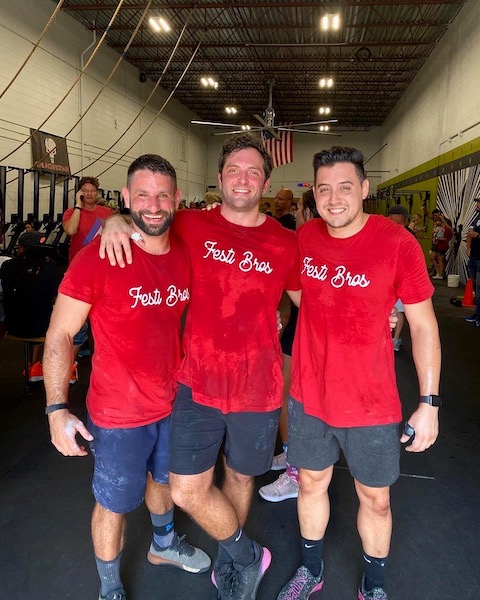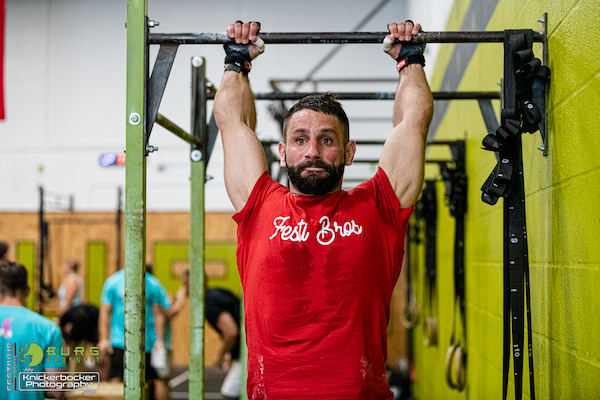2021 Festivus Games
 Once a year the Festivus Games competition is held around the U.S. This is an opportunity for novice and intermediate athletes to test out workouts that are designed specifically for them – “no fire-breather types allowed!”. The first Festivus Games was held on April 30th, 2011. Through the years they have done a great job at offering an inclusive experience where no athlete, whether brand new or a year in, will need to scale any of the events.
Once a year the Festivus Games competition is held around the U.S. This is an opportunity for novice and intermediate athletes to test out workouts that are designed specifically for them – “no fire-breather types allowed!”. The first Festivus Games was held on April 30th, 2011. Through the years they have done a great job at offering an inclusive experience where no athlete, whether brand new or a year in, will need to scale any of the events.
Michael, Nathan and Eduardo teamed up and competed in April. Below is a recap of their experience.
1) How long have you been doing CrossFit?
Michael: Started nov 1st 2020 (5 months)
Nathan: I’ve been doing CrossFit for about a year and a half.
Eduardo: Since November 2018. (2.5 years)
2) Was Festivus your first competition?
Nathan: Yep, first competition.
Michael: Yes, aside from the 2021 Open/FNL? (LOL)
Eduardo: Yes, this was my very first competition.

Jay Knickerbocker Photography
3) Describe some of the highlights from your experience with the Festivus Games. What did you like about it? What was your favorite workout? Any learnings?
Eduardo: Training for the competition was very fun and definitely a big chunk of the overall experience. The day before the completion I was anxious and definitely had the Crossfit butterflies. On the day of the competition we brought 2 days worth of food and fluids; a bit excessive, but very necessary. Before the very first WOD, we started casually jogging and I stuck my feet in a whole and sprained my ankle; but thanks to the Festi Bros’s support and containment, and a fellow crosfitter that mummy taped my ankle, we were able to complete all 4 workouts without any problem. For every WOD we performed 25-30% better than the best of our practices, thanks to the communication, the 80/20 (described below) rule and our little friend adrenaline.
What I liked about Festivus, was the fact that movements were not very complex so we had to work on the speed, capacity, communication and strategy.
My Favorite workout was the very last one: “Tons of Fun”; we had to choose one weight (#105 in our case) to do ground to overhead any way we pleased and accumulate as much poundage as possible in 8 minutes. What I liked about it was that we could have gotten a better score by going much lighter and faster (most teams did that), but I really enjoyed that we worked very hard throughout the workout and I wouldn’t have it any other way.
In terms of lessons, I took a few home:
- Any movement can be learnt and improved as long as you have a goal and set yourself
a realistic time frame. - The rule of 80/20: perform at 80% of your capacity from the start of the WOD, and pick up
the pace during the last 20% of the WOD. - The hardest part of any WOD is to pace yourself at the beginning.
- Good is better than perfect.
- Strategy and communication (when in a team) will determine how much fun you will have
on the completion floor.
Michael: It was a totally unique feeling performing in the spotlight, it brought back memories of my tennis and martial arts days. It was a great time competing with people who were there to win but also have fun and enjoy the sport of it. I learned that you can always push a little harder. My favorite workout was definitely “Benches Be Crazy”.
Nathan: The whole thing was an awesome experience. There was tangible energy throughout the Host Gym – people smiling, laughing, high-fiving, Theragunning each other, etc. Everyone was there to compete but also to have fun and be around other people who love this sport.
Favorite Workout was “Swing Your Partner Round & Round”. I think this was also the most challenging workout for me, but I liked it because you really have to work with your teammates. There are 3 Rounds of 50 Synchronized KB Swings (53#) with 2 of the teammates before the resting (third) teammate can begin his portion of the workout. Each round your teammates are at different fatigue levels, so you have to balance the desire to knock out all 50 reps while not burning out yourself or your other teammates.
The most salient take-away was from the last workout – Tons of Fun; as many Shoulder to Overhead (any variation) you can complete as a team in 8 minutes. You pick your barbell weight. Points are calculated as Reps x Weight. We thought we could go heavy-ish and still go fast enough to beat the other teams. We actually placed 2nd to LAST because the other teams went SUPER light and crushed the number of Reps. So we learned – lighter and faster is better!

Jay Knickerbocker Photography
4) Did you prepare for this comp? If yes, how?
Nathan: We practiced once or twice a week during open gyms for about a month. Having this type of practice was essential for us to perform as well as we did. Some of the workouts were complex/complicated due to the Team structure of the competition, and it took us several attempts to remove the mental errors we made during the first practice sessions. The practice also gave us the ability to experiment with different rep schemes, weights, and teammate workout orders. Most importantly, it gave us goals to aim for during the competition, because we knew (about) how well we were performing during practice. Really proud of my team because – in every workout during the competition – we outperformed our personal bests (both individually and collectively) from our practice sessions. Can’t ask for more than that!
Michael: Yes, we spent time as a team practicing the 4 WODs during Open Gym on Saturdays and at 5am during the week. We reviewed the rules and did some homework on our own in between meeting as a team.
Eduardo: Yes, we did. During the month and a half prior to competition day, The Festi Bros would meet once a week to train together, and we would also train individually on certain movements. How? In our weekly sesh we would get together either at Seaward or Real Fitness to do 1 or 2 of the workouts announced for the competition, and immediately after we would share thoughts and keep a record of our performance. This way we rehearsed communication during the WOD (very important), learnt what needed improving and had a sense of what we were able to do. Then, individually, we would work on our weaknesses or further improve certain movements that would be present in the Festivus games (bench press, DUs, C&J, Pull-ups, etc…)

Jay Knickerbocker Photography
5) What advice or tips would you offer to someone who is on the fence of competing?
Nathan: Practice ahead of time and bring lots of food, water, and recovery tools. It’s a LONG day and you’ll have several hours between each workout. You want to make sure you’re keeping yourself in good physical and mental shape between workouts. Also, a music speaker and a
tent were clutch!
Eduardo: Do it. It is an experience that you owe to yourself.
When training for a competition, you will improve and learn several movements that you wouldn’t if you didn’t have this goal/commitment. The day of the competition, you will experience so many emotions and sensations that can only be felt during a competition. And, after finishing your competition and the day-long rush of adrenaline has dissipated, you will calmly look back at and feel happy and proud of yourself regardless of your ranking. I did. Lastly, if you are competition shy, team competitions are the best way to start.
Michael: It’s always worth it… you may or may not like it… you may or may not do it again, but you should do it so you can do something new. Specifically, Festivus is extremely accessible to all novice and intermediate athletes.
6) Feel free to add anything else.
Michael: We felt prepared and definitely gave it our all. It was humbling to place 4th at our location and rank around top 20% nationally out of 1500+ teams. Leaving the Festivus games I was both a bit down yet happy. I was so sure we would podium and when we ranked 4th it bummed me out a bit. However, it really threw fuel on the burning fire to compete again. I’m excited to train for the next competition or challenge.
Eduardo: After Festivus, I learnt I really liked competing. I felt very comfortable on the competition floor regardless of how behind or ahead we were of the other team, and I strongly believe it was because of how we practiced and strategized.






